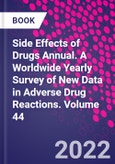Side Effects of Drugs Annual: A Worldwide Yearly Survey of New Data in Adverse Drug Reactions, Volume 44, first published in 1977, presents clinicians and medical investigators with a critical survey of new data and trends in adverse drug reactions and interactions. Topics covered in this new release include Thyroid hormones, Iodine and Iodides, and Antithyroid Drugs, Side Effects of Antidepressant Medications, Side Effects of Lithium, Side Effects of Opioid Analgesics and Narcotic Antagonists, Side Effects of Beta-lactams and Tetracyclines, Side effects of Anti-diabetic Drugs, Vaccines, Side Effects of Neuromuscular Blockings Agents and Skeletal Muscle Relaxants, and much more.
Other chapters cover General Anesthetics and Therapeutic Gases, Drugs that Act on the Respiratory Tract, Positive Inotropic Drugs and Drugs Used in Dysrhythmias, Metals and Metal Antagonists, Antiseptic Drugs and Disinfectants with special scrutiny of COVID-19 pandemic related side effects, Drugs in tuberculosis and leprosy, Anthelminthic drugs, Blood and blood treatments, and a variety of other topics.
Please Note: This is an On Demand product, delivery may take up to 11 working days after payment has been received.
Table of Contents
1. Thyroid hormones, Iodine and Iodides, and Antithyroid Drugs
2. Side Effects of Antidepressant Medications
3. Side Effects of Lithium
4. Side Effects of Opioid Analgesics and Narcotic Antagonists
5. Side Effects of Beta-lactams and Tetracyclines
6. Side effects of Anti-diabetic Drugs
7. Vaccines
8. Side Effects of Neuromuscular Blockings Agents and Skeletal Muscle Relaxants
9. Drugs of Abuse
10. Side Effects of Drugs used in the treatment of Alzheimer's disease
11. General Anesthetics and Therapeutic Gases
12. Drugs that Act on the Respiratory Tract
13. Positive Inotropic Drugs and Drugs Used in Dysrhythmias
14. Metals and Metal Antagonists
15. Antiseptic Drugs and Disinfectants with special scrutiny of COVID-19 pandemic related side effects
16. Drugs in tuberculosis and leprosy
17. Anthelminthic drugs
18. Blood and blood treatments
19. Side effects of drugs used in ocular treatment
20. Vitamins, amino acids, and drugs and formulations used in nutrition and complementary medicine
21. Side effects of anticancer medications
22. Drugs for Metabolic Bone Disease
23. Drugs that affect blood coagulation, fibrinolysis and hemostasis
24. Antiviral
25. GI tract
26. Anti-epileptic Medications
27. Antifungal
28. Miscellaneous Antibacterial Agents
29. Beta adrenergic antagonists and antianginal drugs
30. Antilipid
31. Anti-inflammatory and antipyretic analgesics and drugs used in gout
32. Antipsychotic drugs�
33. Side effects of Antihypertensive drugs
34. Cerebral and peripheral circulations
35. Immunomodulators
Authors
Sidhartha D. Ray Senior Professor of Pharmaceutical and Biomedical Sciences, Touro College of Pharmacy, Touro University System, Manhattan, NY, USA. Sidhartha D. Ray, PhD, FACN serves as a Senior Professor of Pharmaceutical and Biomedical Sciences at The Touro College of Pharmacy at Manhattan, New York. Prior to this he served as Professor of Pharmaceutical Sciences for nearly 2 decades at the Arnold & Marie Schwartz College of Pharmacy and Health Sciences of Long Island University, New York, and as the founding chair of Pharmaceutical Science department at Manchester University College of Pharmacy, Indiana, USA. He has been in the health sciences academy for over 35 years mainly focusing on pharmacy teaching, research and service. Dr. Ray's research program focus on drug & chemical induced organ toxicology, mechanistic & molecular toxicology, adverse drug reaction mechanisms, side effects of a number of therapeutically relevant drugs and environmentally significant chemicals. Over the last two decades, Dr. Ray's seminal discoveries have provided clear understandings on the dynamic role of apoptosis, necrosis and necraptosis during organotoxic reactions and have influenced the development of safety measures for a stunning variety of xenobiotics, phytochemicals and nutraceuticals. He is internationally recognized as a leader in the scientific community and was one of the front runners in exploring mechanisms of drug and chemical-induced programmed and un-programmed cell death in in-vivo models. His landmark studies on the interplay of bcl-2, bcl-xl, p53, bad and bax during acetaminophen induced cell death and its prevention by grape seed proanthocyanidin extract has earned worldwide citations. His peer recognition and acknowledged service contributions are reflected by his election into multiple international professional organizations, such as the Society of Toxicology (SOT), Society of Free Radical Biology & Medicine (SFRBM), American Society of Pharmacology & Experimental Therapeutics (ASPET), American Association of Colleges of Pharmacy (AACP) and American College of Nutrition (ACN). Dr. Ray is an Associate Editor of Encyclopedia of Toxicology (3rd Ed, Elsevier, 2014), and serves on the editorial boards of multiple prestigious international journals, including 'Archives of Toxicology' and 'Oxidative Medicine & Cellular Longevity'.Based on his contributions to teaching, service and scholarship to health sciences in general, Dr. Ray received multiple prestigious awards, inc. the American Academy of Clinical Toxicology's national research award (1996), 'Fellow of the American College of Nutrition' honor in 1999, David Newton Award for Excellence in Teaching Pharmacy (2005), the Biennial Abraham Krasnoff Memorial Award for Lifetime Scholarly Achievement (2008), Arnold & Marie Schwartz College of Pharmacy & Health Science's 'Wall-of-Fame' honor (2011), the Society of Toxicology's 'Undergraduate Educator of the Year' national award (2013), and the Manchester University's 'Outstanding Scholar of the Year' award (2014). He currently serves on the SOT-NIH-NLM's joint Toxlearn Project, SOT Undergraduate Task Force (2007 - present), and has previously served on the SOT's Education Committee (2007 - 2010). In his lifetime, Dr. Ray has mentored research to numerous PharmD, MS, MD and PhD students in a number of areas of toxicology and biomedical sciences, made seminal contributions to the fields of pharmacology, toxicology, free radical biology, anticancer mechanism, phytochemicals, nutraceuticals & dietary supplements, and molecular safety sciences. Dr. Ray loves to promote 'Lifelong Learning' strategies to his students and clearly models his beliefs day in and day out. Visit URL: www.sidhartharay.com/ for more details.








